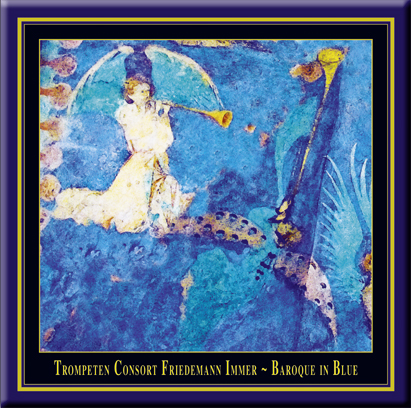 |

|
|
 |

|
|


|
The Friedemann Immer Trumpet Consort with works by Baroque Trumpets: A release on the 20-year anniversary of the ensemble A concert recording from the basilica of the Sound - and Mastering: Andreas Otto Grimminger Audio CD, DDD, ca. 71 minutes |
|
Amazing, these blues notes; for me, a subject that never ceases to fascinate, those small, dirty inconsistencies that give Swing its grooviness time and time again.. Recently, I thought that it would really sound very interesting if these hallmarks of jazz were actually played on historical instruments. What really surprised me, however, was discovering - in the course of comparing the baroque compositions of old maters - that these stylistic tools of the musical revolution of the 20th century were in fact quite usual back in Bach's day or at the court of the French King. I wish you a most pleasant evening with this concert. Josef-Stefan Kindler |
|
Established in 1988 by Friedemann Immer, the Consort dedicates itself to the music played by the trumpet ensembles of the Baroque age The Consort's programmes exude the wonderfully resplendent sound typical of the music of that time. All the members of the ensemble are specialists in old music and, accordingly, the trumpeters play baroque trumpets that have no valves. In doing so, they are treading in the footsteps of a profession that was highly regarded at a time when powdered wigs and buckled shoes were de rigueur. The trumpet players employed at the courts and in the towns, who provided the necessary musical accompaniment at coronations, weddings, tournaments and other festive occasions, banded together in guilds of their own that had extremely strict rules and regulations. The ensembles were made up of three to eight trumpeters and timpanists, supplemented by strings, woodwinds and continuo instruments.
In its "normal" line-up, the Friedemann Immer Trumpet Consort is accompanied by timpani and organ - so that the magnificent sound of the trumpet stays firmly in the forefront of things. In some works, the organ takes over the string part - an arrangement that is totally in keeping with the practice of the times. The ensemble's repertoire encompasses all of Baroque music. The line-up is unusually large for a standing ensemble of Baroque trumpets and allows a lot of different options in the way of variations. So the Consort not only performs works for one to six trumpets with accompaniment, it also presents - along with outstanding song soloists - cantatas and arias with all the original parts being performed. In many a project, strings are also brought in. And, as what can be done musically and sound-wise on the Baroque trumpet differs quite considerably from anything that its present-day "daughter" with all its valves can do, the ensemble has also turned to interpreting modern works on the Baroque trumpet - and they are probably totally alone in this. The repertoire of the Trumpet Consort not only includes original works by Benjamin Britten, for instance, but quite a large range of jazz pieces as well. Since its formation, the ensemble has been giving concerts both at home and abroad. They have played at many different festivals, examples being the Arolsen Baroque Festival, the Styriarte in Graz and the Kokutopia Festival in Tokyo as well as the International Trumpet Guild Conference and the Historic Brass Symposium in the USA.
|
|
4. Ich bitte Dich, 5. March for Timpani Solo
8. Alamanda 9. Hello BB&C
10. Fanfare for St. Edmundsbury
12. Danke für diesen guten Morgen 13. Jesus meines Lebens Leben 14. Blooze Cornett - Friedemann Immer |
|
The Series Publishing culture in its authentic form entails for us capturing and recording for posterity outstanding performances and concerts. The performers, audience, opus and room enter into an intimate dialogue that in its form and expression, its atmosphere, is unique and unrepeatable. It is our aim, the philosophy of our house, to enable the listener to acutely experience every facet of this symbiosis, the intensity of the performance. The results are unparalleled interpretations of musical and literary works, simply - audiophile snapshots of permanent value. The concerts in Maulbronn monastery, which we document with this edition, supply, in many ways, the ideal conditions for our aspirations. It is, above all, the atmosphere of the romantic, candle-lit arches, the magic of the monastery in its unadulterated sublime presence and tranquillity that impresses itself upon the performers and audience of these concerts. Renowned soloists and ensembles from the international arena repeatedly welcome the opportunity to appear here - enjoying the unparalleled acoustic and architectural beauty of this World Heritage Site (monastery church, cloister gardens, lay refectory, etc.), providing exquisite performances of secular and sacred music. Under the patronage of the Evangelical Seminar, the Maulbronn Monastery Cloister Concerts were instigated in 1968 with an abundance of musical enthusiasm and voluntary leadership. Within the hallowed walls of the classical grammar and boarding school, existent for more than 450 years, some of society's great thinkers, poets and humanists, such as Kepler, Hölderlin, Herwegh and Hesse received their first impressions. The youthful elan, the constructive participation of the pupils, continuing the tradition of their great predecessors, constructs an enlightened climate in which artistic ambitions can especially thrive. Twenty-five concerts take place between May and September. Their success can be largely attributed to the many voluntary helpers from near and far. Flourishing culture in a living monument, created for the delight of the live audience and, last but not least, you the listener, are the ideals we document with this series - directly in digital stereo. Andreas Otto Grimminger & Josef-Stefan Kindler |